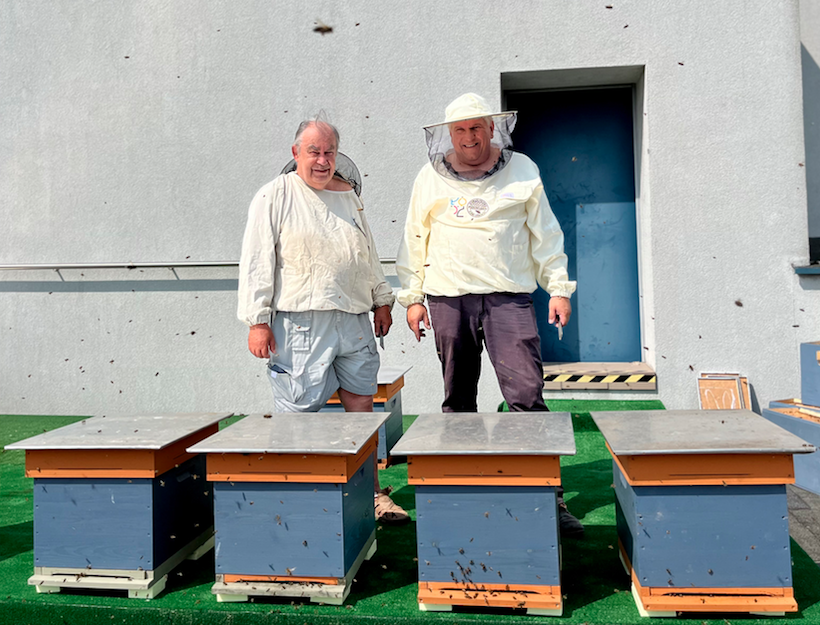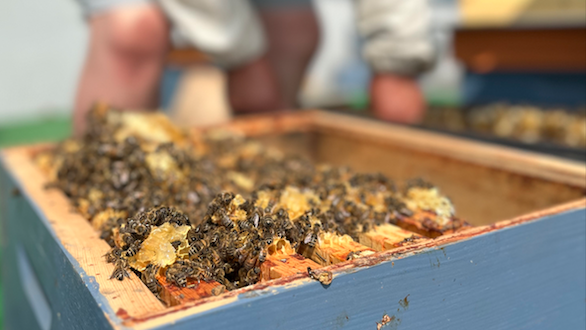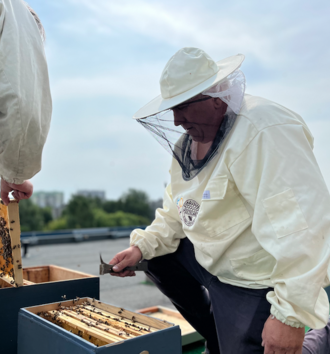UniLodz Beeblioteka – care for the natural environment
The UniLodz Beeblioteka [Bee-library] is another project promoting care for the natural environment that the University has been implementing. The apiary is looked after by beekeepers from the Lodz Apiarist Association, and the families of bees support the urban ecosystem. First of all, these insects pollinate urban plants, which enables the production of seeds and fruit, which in turn help maintain the bee population. The green surroundings of the library are an ideal place for beehives – the proximity of Jan Matejko Park and the squares of the university campus is particularly important in this case.
As beekeepers say, bees are not aggressive. To attack us, they must feel threatened, so as long as we do not disturb them in their work, we can feel calm and safe.
It should be mentioned that the honey obtained from urban bees is in no way inferior to that produced by bees from rural apiaries, sometimes its quality is even higher. This is due to the longer flowering season of bushes, as well as a greater variety of plants in cities.

The city beehives initiated by the University of Lodz Library are to contribute to the popularisation of knowledge about bees and beekeeping among the academic community and residents of Lodz. Thanks to the UniLodz Beeblioteka, it will also be possible to raise awareness of the great importance of these insects for humans.
Bees – priceless for the ecosystem
A bee was found in amber in the Hukawng Valley in 2006. Research has shown that it comes from the Lower Cretaceous period and thus, is about 100 million years old.
Throughout the life of the earth, together with other pollinator insects, bees have been an essential element maintaining our ecosystem through pollination, thanks to which plants can flourish, and these, in turn, regulate the temperature of the ground and purify the air. Bees also play a crucial role in food production, as around 84% of crop species in Europe require insect pollination
– explains Artem Luhovyi, keeper of the apiary (consisting of 5 beehives) and apitherapy house at the Faculty of Economics and Sociology at the University of Lodz.
Apart from pollinating, bees produce honey, which is rich in vitamins and has a positive effect on metabolism.
Taking into consideration the current climate change and the scale of anthropogenic activities, as a result of which 75% of the population of pollinator insects has disappeared within 30 years, we should be more responsible for the environment. We should take care of the ecosystem, pollinator insects and change the environment at the local or national level
– adds Artem Luhovyi.
Artem Luhovyi is a graduate of the innovative "Eco-City" study programme at the University of Lodz. Currently, he is a second-year student of MA studies in the field of Spatial Management, Faculty of Economics and Sociology of the University of Lodz. He is the keeper of the apiary and the apitherapy house at the same faculty. When you get inside, you can relax with the sounds of bees and the smell of honey. The fenced apiary is located in a green area.
The healing effect of honey
Thanks to the honey harvesting, we can also support cancer patients. Honey supports oncological treatment – thanks to its health-promoting properties, the human body tolerates chemotherapy and radiotherapy better and recovers faster. This year, for the second time, University of Lodz has donated 20 litres of honey for oncology patients at the Copernicus Memorial Hospital in Lodz.
Source: University of Lodz Library
Edit: Communications and PR Centre, University of Lodz
The mission of the University of Lodz is to conduct reliable research and actively disseminate facts and research results so as to wisely educate future generations, be useful to society and courageously respond to the challenges of the modern world. Scientific excellence is always our best compass. Our values include: courage, curiosity, commitment, cooperation and respect.


